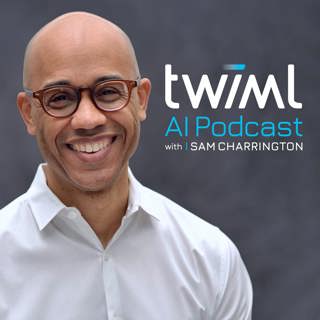
Re-Architecting Data Science at iRobot with Angela Bassa - TWIML Talk #294
Today we’re joined by Angela Bassa, Director of Data Science at iRobot. In our conversation, Angela and I discuss: • iRobot's re-architecture, and a look at the evolution of iRobot. • Where iRobot gets its data from and how they taxonomize data science. • The platforms and processes that have been put into place to support delivering models in production. •The role of DevOps in bringing these various platforms together, and much more!
26 Aug 201948min

Disentangled Representations & Google Research Football with Olivier Bachem - TWIML Talk #293
Today we’re joined by Olivier Bachem, a research scientist at Google AI on the Brain team. Olivier joins us to discuss his work on Google’s research football project, their foray into building a novel reinforcement learning environment. Olivier and Sam discuss what makes this environment different than other available RL environments, such as OpenAI Gym and PyGame, what other techniques they explored while using this environment, and what’s on the horizon for their team and Football RLE.
22 Aug 201942min

Neural Network Quantization and Compression with Tijmen Blankevoort - TWIML Talk #292
Today we’re joined by Tijmen Blankevoort, a staff engineer at Qualcomm, who leads their compression and quantization research teams. In our conversation with Tijmen we discuss: • The ins and outs of compression and quantization of ML models, specifically NNs, • How much models can actually be compressed, and the best way to achieve compression, • We also look at a few recent papers including “Lottery Hypothesis."
19 Aug 201950min

Identifying New Materials with NLP with Anubhav Jain - TWIML Talk #291
Today we are joined by Anubhav Jain, Staff Scientist & Chemist at Lawrence Berkeley National Lab. We discuss his latest paper, ‘Unsupervised word embeddings capture latent knowledge from materials science literature’. Anubhav explains the design of a system that takes the literature and uses natural language processing to conceptualize complex material science concepts. He also discusses scientific literature mining and how the method can recommend materials for functional applications in the future.
15 Aug 201939min

The Problem with Black Boxes with Cynthia Rudin - TWIML Talk #290
Today we are joined by Cynthia Rudin, Professor of Computer Science, Electrical and Computer Engineering, and Statistical Science at Duke University. In this episode we discuss her paper, ‘Please Stop Explaining Black Box Models for High Stakes Decisions’, and how interpretable models make for more comprehensible decisions - extremely important when dealing with human lives. Cynthia explains black box and interpretable models, their development, use cases, and her future plans in the field.
14 Aug 201948min

Human-Robot Interaction and Empathy with Kate Darling - TWIML Talk #289
Today we’re joined by Dr. Kate Darling, Research Specialist at the MIT Media Lab. Kate’s focus is on robot ethics, the social implication of how people treat robots and the purposeful design of robots in our daily lives. We discuss measuring empathy, the impact of robot treatment on kids behavior, the correlation between animals and robots, and why 'effective' robots aren’t always humanoid. Kate combines a wealth of knowledge with an analytical mind that questions the why and how of human-robot intera
8 Aug 201943min

Automated ML for RNA Design with Danny Stoll - TWIML Talk #288
Today we’re joined by Danny Stoll, Research Assistant at the University of Freiburg. Danny’s current research can be encapsulated in his latest paper, ‘Learning to Design RNA’. In this episode, Danny explains the design process through reverse engineering and how his team’s deep learning algorithm is applied to train and design sequences. We discuss transfer learning, multitask learning, ablation studies, hyperparameter optimization and the difference between chemical and statistical based approac
5 Aug 201937min

Developing a brain atlas using deep learning with Theofanis Karayannis - TWIML Talk #287
Today we’re joined by Theofanis Karayannis, Assistant Professor at the Brain Research Institute of the University of Zurich. Theo’s research is focused on brain circuit development and uses Deep Learning methods to segment the brain regions, then detect the connections around each region. He then looks at the distribution of connections that make neurological decisions in both animals and humans every day. From the way images of the brain are collected to genetic trackability, this episode has it all.
1 Aug 201937min






















